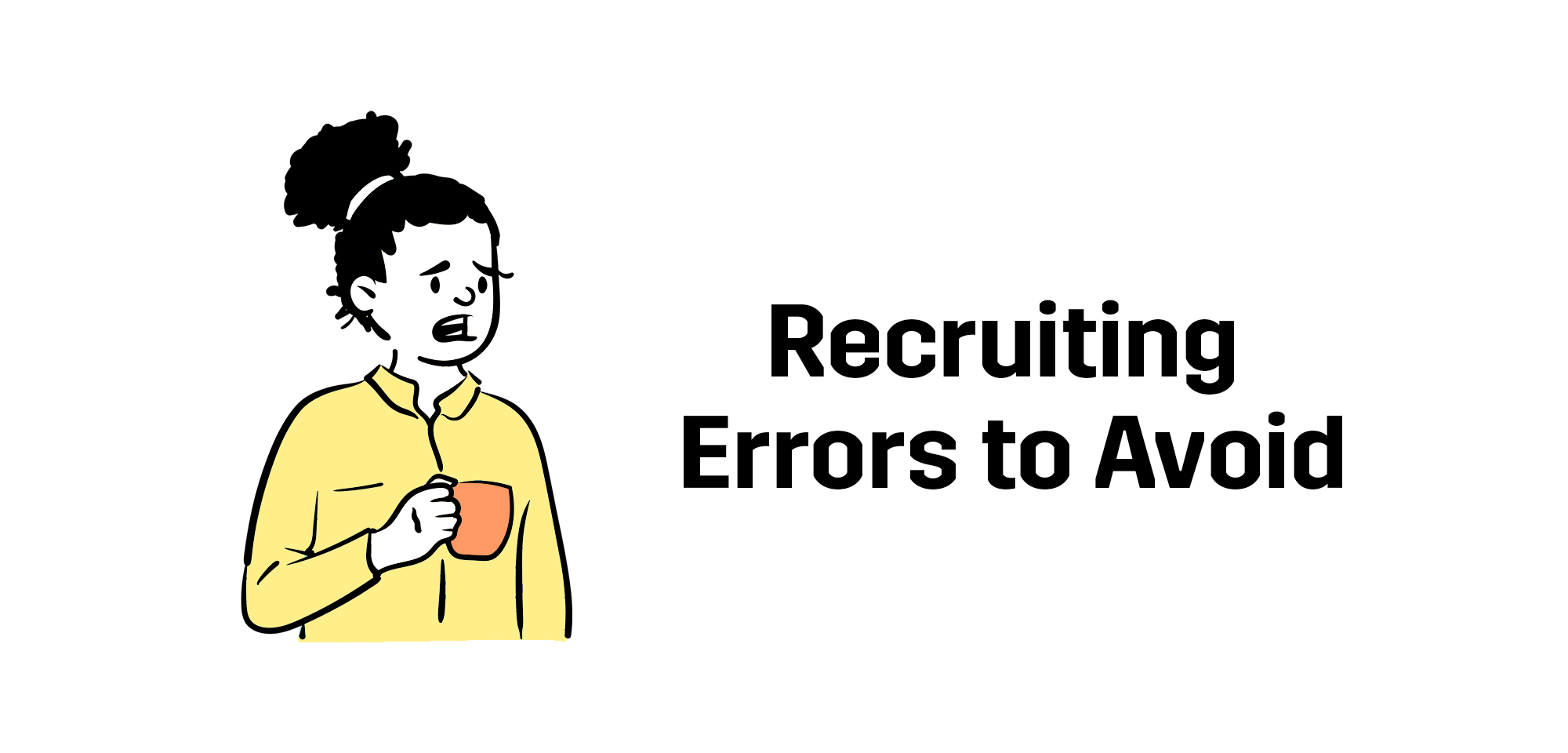Finding the right people to work for you is essential for the growth of any business. In Nigeria, the hiring process can be complex, and mistakes that cost a lot of money can happen if they need to be done right. Learn common mistakes to avoid when recruiting the best people for your team, and make sure you get the job done right. This article will talk about some of these mistakes and give you tips on how to avoid them.

This will help you speed up the hiring process and create a robust and capable team.
Here are some common mistakes to avoid when recruiting
- Not enough detailed job descriptions
- Not considering cultural fit
- Not enough screening processes
- Forgetting about soft skills
- Not caring about diversity and inclusion
- Putting too much stock in qualification
- Wrong way of conducting an interview
- Not doing background checks
- Not making the candidate experience pleasant
- Not Making good use of technology
1. Not enough detailed job descriptions
When hiring people, one common mistake to avoid when recruiting is not making clear job titles. You might hire the wrong person if you don’t specify the exact tasks, qualifications, and expectations for a job. This could waste your time and money as you sort through applications from people who don’t meet your needs.

To avoid this, write detailed job descriptions for every job you seek. Make it clear what the role’s duties are and what skills and knowledge are needed. This clarity will help you find suitable people who are a good fit for the job, which will speed up and improve the hiring process. Remember that writing a clear job description is the first thing you need to do to find the right people for your team.
2. Not considering cultural fit
Another common mistake to avoid when hiring is not considering cultural fit. If you only look at a candidate’s skills and experience, it’s easy to miss how well they will fit in with your business culture, which could cause problems in the future. Cultural fit is essential for keeping the workplace peaceful and productive.
To prevent this mistake, ensure that candidates fit in with your company’s values, way of working, and how teams work together. During the interview, ask them questions that show how they feel, what they like, and how they would handle different scenarios. You should also include team members in the interview process to get their thoughts on how well the candidate fits in with the group.
If you look at cultural fit, you will find people who can do the job and will do well in your business’s environment. This method could make your employees happier and more likely to stay with the company, which is good for business in the long run.
3. Not enough screening processes
One of the most common mistakes to avoid when recruiting is not using enough screening tools. If your screening process is too quick or needs to be more thorough, you might hire people unprepared for the job. This can cause people to do their jobs poorly, bring down the team’s morale, and eventually cause more people to quit.
To avoid this mistake, ensure your screening process is thorough and well-organized. First, carefully read all the resumes and cover letters to find the best people who meet the most basic needs. Next, use phone or video interviews to narrow your choices further. This will help you see how well they can communicate and whether they fit the job well.
Include tests or assessments of skills related to the job so that you can fairly judge each candidate’s skills. Background checks and calling references are also important ways to ensure that the information candidates give you is correct and to learn about how they have behaved at work.
A thorough screening process can help you hire better people and make your team more robust and effective. You can be sure the people you hire are qualified and fit your company’s culture and goals if you do thorough screening.
4. Forgetting about soft skills
One common mistake to avoid when recruiting is not focusing on soft skills. Qualifications and professional skills are essential, but soft skills are much more critical for a candidate’s success and ability to fit in with your team.
Soft skills, like the ability to communicate, work as a team, solve problems, and adapt, show how well a person can handle difficulties and work with others. If you only look at professional skills, you might hire someone who can do the work but needs help getting along with others or adapting to new situations.
To avoid this mistake, ensure the interview process includes situations and questions that test the candidate’s soft skills. Find out how they’ve worked with others, solved problems, and adjusted to new conditions. These skills can also be tested through role-playing games or scenario judgement tests.
You might also want more than one team member to participate in the interview to get a more complete picture of the candidate’s social skills. This method ensures that the people you hire have the technical and people skills needed to thrive in your company’s culture.
By emphasising soft skills when hiring, you can make your team work better together, which will eventually help your company succeed in the long run. Remember that valuing hard and soft skills will help you make better hiring choices.
5. Not caring about diversity and inclusion
Another common mistake to avoid when recruiting is not focusing on diversity and inclusion. Making sure your workplace is diverse and welcoming is not only the right thing to do, it’s also good for business. Diverse teams have a lot of different ideas, points of view, and ways of handling problems, which can lead to new products and better decisions.
If you care about variety and inclusion, you can take advantage of the benefits of having people on your team with a wide range of experiences and points of view. To prevent this mistake, try to hire people from various cultures, backgrounds, and experiences. The first step is to write job descriptions open to everyone, do not use biased words, and appeal to a wide range of people.
Ensure your hiring process is open and unbiased during the hiring process. Standardised interview questions and anonymous resume reviews can help reduce unconscious bias. Also, teach the hiring people about the value of variety and how to recognise and deal with their biases.

Diversity and inclusion should be a part of your business, not just how you hire people. Ensure all your workers feel valued and included regardless of their background. To do this, you can encourage inclusive leadership, provide diversity training, and set up staff resource groups.
When you prioritise diversity and inclusion, you create a workplace that loves and respects differences and uses them to boost performance and creativity. Remember that supporting diversity and inclusion is not only one of the most common mistakes people make when hiring, but it can also help your company succeed in a big way.
6. Putting too much stock in qualifications
common mistake to avoid when recruiting is relying too much on skills. Academic qualifications and certifications are good ways to see how knowledgeable and skilled a candidate is, but they shouldn’t be the only thing you use to decide who to hire. If you focus too much on a candidate’s skills, you might miss other important factors that affect how well they will fit in with your organisation and their chances of success.
When you put too much weight on qualifications, you might miss out on candidates with essential experience, valuable skills, and a strong work ethic who don’t have the best degrees or certifications. Most of the time, these traits are just as important, if not more important, than official qualifications.
To avoid making this mistake, think about how to evaluate people more thoroughly. In addition to their schooling, you should also look at their work experience, problem-solving skills, and ability to get along with others. Pay attention to what they’ve done at work before and how they’ve dealt with problems in the real world.
You should also consider how well the candidate fits your business’s culture and values. Cultural fit can significantly affect how well and how happy a person is with their job. Someone who might not have the best skills might be an excellent fit for your team and how your business works.
Structured interviews and actual tests are also good ways to determine if a candidate is suitable for the job. With these methods, you can better understand what they will do on the job.
It’s important to note that qualifications are only one part of the story. You can find well-rounded candidates who bring a lot of different strengths to your team if you don’t make the mistake of counting too much on qualifications. This will ensure the hiring process is more fair and effective and help you avoid one of the most common mistakes people make.
7. Bad ways to conduct interviews
A common mistakes to avoid when recruiting is using bad interview skills. To find out if a candidate is a good fit for your company, you need to conduct effective conversations. But if there are problems with how you question people, you might need help finding the best ones.
A common mistake is not getting ready for the interview well enough. Without a clear plan or list of questions, you could forget to ask important questions about the candidate’s skills, experience, and fit for the job. An organised interview guide ensures all candidates are treated equally and fairly.
Another problem is asking questions that need to be more relevant or suitable. Ask only questions about the job and how well the candidate can do it. Ask them things that are too personal or unrelated to their job. This keeps the conversation on track and ensures everyone is polite and professional.
Another big mistake is not carefully listening during the interview. If you talk too much or don’t listen to the candidate’s words, you won’t get a good idea of how well they fit the job. Give people ample time to talk, ask follow-up questions, and show that you are genuinely interested in what they say to practise active listening.
Another trap is bias in the questioning process. It’s simple to let your tastes or unconscious biases affect your choices. To prevent this, use standard assessment criteria and have more than one interviewer. This helps ensure that choices are based on facts, not personal opinions.
Last but not least, giving too little input is a mistake. Candidates like getting helpful feedback, which can help them improve for future opportunities. It also suits your company and can make people like you, even if they aren’t chosen.
You can hire the right people more quickly if you don’t use lousy interview methods. Key things you can do to improve your hiring process are to be well-prepared, ask relevant questions, listen carefully, avoid bias, and give feedback. These steps will help you avoid one of the most common mistakes people make when hiring so you can build a strong team.
8. Not doing background checks
A common mistakes to avoid when recruiting is not doing background checks. Even though it might take a lot of time or be unnecessary, thorough background checks are essential for making wise hiring decisions and keeping your business safe.
If you don’t do background checks, you might hire people with a history of lying, breaking the law, or other problems that could put your organisation at risk. Background checks help you ensure the information candidates give you is correct and find any issues they have yet to tell you about.
Background checks can also help you determine whether a candidate fits the job and the company culture. For example, if a candidate has had problems with coworkers or behaved unethically, that could be a sign that they are not a good fit for your team.
Background checks can examine many things, such as criminal records, work experience, educational credentials, professional licenses, and references. By doing these checks, you can be sure that the people you hire are trustworthy, skilled, and able to do the job well.
Background checks can also help keep your business safe from possible legal problems. If you hire someone without doing your research first and then find out they did something wrong or illegal, your company could be sued. Background checks add an extra layer of security by showing that you did what you could to check out job applicants before choosing them.
Overall, you should only do something other than skip background checks when hiring. Thorough background checks can lower risks, make better hiring choices, and keep your business safe. Background checks must be done with time and money if you want to build a trusting team.
9. Not making the candidate experience pleasant
A common mistakes to avoid when recruiting is not giving candidates a good experience. From the first application to the final hiring decision, how you treat job applicants affects how they see your company and can affect their choice to accept a job offer or tell others about your business.
If you give candidates a good experience, it could help your employer’s brand and image. Suppose a candidate needs a better experience during the hiring process. In that case, they may post about it on social media or review sites, which could stop other talented people from applying to your business.
To avoid this mistake, it’s essential to prioritise conversation, honesty, and professionalism during the hiring process. Tell applicants how their applications are going, give them straightforward advice for each step, and answer any questions they may have immediately.
Additionally, ensure that all conversations with candidates are polite and respectful, even if they don’t get the job. You can leave a candidate with a good image of your company even if they are not chosen. This could make them want to apply again or tell other qualified people about your company.
Another way to give candidates a good experience is to make the application process smooth and easy. To make the process as easy as possible, reduce the number of steps and areas that need to be filled out. Also, ensure that your online application portal works well on mobile devices and is simple.
Consider asking candidates for feedback on how they felt about the hiring process. This feedback can give you helpful information about how to improve and help you find any problems that might make it hard to hire the best people.
In conclusion, one common mistake you should avoid when hiring is not giving candidates a good experience. By prioritising communication, openness, professionalism, and the user experience, you can improve your company brand, attract better candidates, and build a stronger, more successful team.
10. Not making good use of technology
A common mistake to avoid when recruiting is not using technology well. In this digital age, technology is very important for making the hiring process easier, faster, and more accessible to a larger group of candidates.

If you don’t use technology, you might miss chances of getting the best employees and improving your hiring process. To hire the best people, here are some essential ways you can use technology:
- Online job boards and platforms: Post job openings and attract more applicants using online job boards and platforms. Sites like LinkedIn, Indeed, and Glassdoor make it easy and quick to post job openings, find candidates, and interact with people looking for work.
- Application tracking systems (ATS): Use an ATS to make the hiring process more accessible, track potential applications, and see how they do as the job is filled. An ATS can help you organise information about candidates, automate administrative chores, and make hiring more organised and efficient.
- Social media recruitment: Use LinkedIn, Twitter, and Facebook to post about job openings, showcase your company’s brand, and interact with people not actively looking for work. Social media sites are a cheap and easy way to reach a wide range of possible candidates and raise awareness of your brand in your field.
- Video interviewing: Use video interviewing tools as part of your hiring process to interview people from afar and get a better idea of who they are. Video interviews can save you time and money because they don’t require in-person talks. They can also tell much about a candidate’s personality and communication skills.
- Tools for evaluating candidates: Use pre-employment testing apps and tools to assess candidates’ skills, abilities, and cultural fit. These tools can help you make better hiring choices and ensure that candidates have the skills and qualifications to do well.
Read Also. What Are The Requirements For Opening A Business Bank Account In Nigeria?
Conclusion
To sum up, if you want to get good at hiring people in Nigeria, you need to avoid these typical mistakes. Now, improve your visibility by adding your business to our list. Take the chance to show your company that it is extraordinary and get the best people to work there. Sign up now!



